- Home
- Douglas Niles
The Druid Queen Page 4
The Druid Queen Read online
Page 4
Tell him the truth, a voice whispered inside her head—a voice she forcefully ignored. She couldn’t admit even to herself a fact that had slowly been growing in her heart and her mind: that she did not love this generous, handsome man who had risked his life and his ship to aid the rescue of her father.
She wanted to love him—indeed, a part of herself told her that she was obligated to love him. But neither of these altered the simple fact that she did not.
“I—I wish I could stay for the rest of the summer,” Brandon said sincerely. “But my father must know of our safe return, and I have already been absent from my own kingdom for too long. You return to Callidyrr in the autumn?” concluded the prince.
“Always in the past we’ve left Corwell before the gales of Harvestide. I assume Father will want to do the same this year, but I’ll send word to you about our plans. It’s not as if you’re sailing to the ends of the world!”
She wanted to speak lightly, but the words came out more harshly than she intended. She saw the hurt on Brandon’s face and tried to ease it by taking his hand. “I will write,” she promised.
He nodded glumly, then kissed her. She returned his embrace, but once again she relished a sense of freedom when he released her. Why can’t I tell him? The question nagged at her, but she forced it away. She watched him step into the longboat that several kindly fisherffolk had provided. Tavish already sat near the bow, busily tuning the strings of her harp, though she stopped long enough to wave a cheery good-bye to the princess on the pier.
The Prince of Gnarhelm stood tall in the stern of the little boat as he was rowed to his proud longship. Alicia stood watching, waving finally as he climbed aboard the vessel. Wind quickly billowed the longship’s sail, and the Princess of Moonshae turned her prow toward the gap in the breakwater. Smoothly she sliced through the waves, shrinking in size as Brandon set a course toward the mouth of Corwell Firth.
By that time, Alicia had already started back to the castle.
* * * * *
Keane saw that the house across from the shrine was indeed a magnificent residence. Set high upon the hill that protected the Upper City, it might have served as a palace to the monarch of some small state. Below swept a vista of the Lower City and its great, encircling arm of the Chionthar River, here widespread and placid, though it had another fifty miles of journey before it reached the sea.
A high wall of whitewashed stone surrounded and screened the grounds, but as he approached the steel-barred gate, Keane saw an expanse of fountains and formal gardens. Several cascading spumes of water splashed merrily, casting streams of spray through the crisp morning air. Detailed mosaics of colorful tile formed a wide walkway leading from the gate toward the columned portico before a grand manor. The house, as white as the walls, gleamed in the morning sunlight.
Though Keane could easily have teleported, levitated, or slipped invisibly into the compound, the nature of his business required him to make a more formal approach. Therefore the tall, lanky wizard wore his finest leather cape, a satin shirt of blue silk, and smooth, high-topped boots of soft doeskin.
A pair of guards in red livery snapped to attention behind the gate as the mage approached. Keane bowed politely before speaking.
“Is the Exalted Inquisitor present? I request the honor of an audience with him.”
“The inquisitor is a very busy man,” sniffed one of the guards, with a disdainful inspection of the magic-user’s finery. “Whom shall we report is calling?”
“I am Keane of Callidyrr, serving as ambassador for His Majesty, High King Tristan Kendrick of the Moonshaes.”
The guard’s eyes, much to Keane’s satisfaction, widened slightly at the information. The man turned and started for the house at a trot while the other guard took pains to effect an absolutely rigid stance. A few minutes later the first guard returned, accompanied by a short, chubby man in a white clerical robe. The symbol of Helm, the All-Seeing Eye encircled by a ring of platinum, bobbed against the latter’s ample belly.
“A royal ambassador … this is a signal honor! Come in, come in, my good lord!” The cleric beamed at Keane, waddling forward and gesturing imperiously to the guard who still stood rigidly at his station. “Open that gate, man—and be quick about it!”
“Thank you,” Keane murmured as the priest bowed and smiled.
“You come from the court of the Kendricks? Your king’s name is known far and wide, of course—an honorable man and a wise and beneficent ruler! But, of course, you know that already. Perhaps there is something that I can help you with? I am the bishou of this temple and shrine—Bishou Harmanius.” The rank of bishou was not unknown to Keane. Harmanius was an influential man and a powerful cleric—but not powerful enough for the mage’s needs.
“Actually, I’m afraid that my business must be conducted with the Exalted Inquisitor. Will he grant me the honor of an appointment?”
“Ahem … well, you see … he is a very busy person these days,” the bishou demurred. “Perhaps if I could relay to him the nature of your business …?”
As they spoke, the pair passed between a pair of tall columns, climbing several large steps to approach the huge, ornately carved doors at the front of the manor. These swung open ponderously at their approach, and Keane saw another pair of scarlet-coated guards, images of immaculate tunics, obsidian-black boots, and buckles of gleaming silver, flanking the entrance.
“It concerns a matter of great importance to my king—a service he desires. Naturally it involves a sizable donation to the coffers of the church.” Keane added the incentive on his own responsibility, suspecting from the opulence around him that it would be an effective inducement. He was not disappointed.
“Of course, the business of an esteemed monarch like King Kendrick must supersede lesser concerns,” noted the cleric, without a hint of irony so far as Keane could tell. “I shall relay your request immediately. Would you be so kind as to wait in here?” Harmanius indicated a large parlor lined with marble walls, the floor buried beneath an array of lush, silken rugs.
“My pleasure,” Keane replied. The cleric bustled into the temple while the magic-user walked slowly about the large chamber, dazzled by the wonders on display.
A large doorway of cut glass led into an enclosed garden, and from it sunlight spilled into the room. Paintings hung along the walls, mostly battle scenes, in which the banner of the All-Seeing Eye floated proudly above the victorious troops. One canvas made a mural along a good-sized wall, depicting the toppling of Maztican gods from their pyramid-shaped temples while the local peoples bestowed gifts of gold and silver on the bishou who had enlightened them. The mage spent several minutes studying the scene, noticing the strong flavor of righteous triumph tinged with bleak and abject conquest.
“Lord Ambassador?”
Keane turned suddenly, surprised that someone had entered the room without being heard. He felt a flash of guilt, as if he had been caught eavesdropping. “Ah, yes—forgive me. I was just admiring your artwork.” He recovered smoothly from his surprise to bow formally to the man he knew must be the Exalted Inquisitor of Helm.
“Splendid, is it not? It commemorates the founding of Helmsport, on the coast of Maztica. Perhaps you know that it has become the major port on that savage shore?”
The cleric, Keane saw, was a very tall man—nearly as tall as the mage himself. He was stout, but not obese. Instead, the inquisitor carried the strong suggestion of a workman’s strength in his barrel chest and large hands. A neatly trimmed beard of rust red framed the priest’s chin, and his blue eyes sparkled with intensity and, perhaps, curiosity.
“I had heard something of that, yes,” noted the mage as the cleric lead him to a pair of comfortable chairs arrayed before a currently unlighted hearth.
“Please, be seated. Allow me to introduce myself—Parell Hyath, Helm’s inquisitor along this coast. Harmanius tells me you wish to discuss a matter of import to your king.”
“That’s correct.” Keane had
already decided that he wouldn’t mention the unfortunate demise of Bakar Dalsoritan. No need to inform the inquisitor that he was the mage’s second choice. Instead, he quickly launched into the explanation.
“His Majesty King Kendrick has recently been rescued from a dire imprisonment. His health is good, but his captors, in an act of sheer brutality, cut off one of his hands. He has commissioned me to … negotiate for the services of a devout man of the gods, a man such as yourself. I am prepared to offer generous inducements should you be willing to return to the isles with me and perform a spell of regeneration on the king.”
Parell Hyath’s blue eyes narrowed subtly, but his lips pursed tightly together.
“This is a worthy cause, to be sure—but I’m afraid that the matter of timing creates a bit of difficulty. My business here in Baldur’s Gate is sure to occupy me for the rest of the year … though perhaps after that?”
Keane shook his head regretfully. He wondered if the cleric spoke the truth or simply raised the issue for negotiation purposes. “I’m sorry, Lord Inquisitor, but His Majesty was most insistent that I return as soon as possible. Isn’t there a way that you could make the journey quickly, returning here to resume your business, and not incidentally earn a respectable fee for your good efforts?”
The magic-user knew that clerics did not possess the wizard’s ability to teleport instantaneously from one place to another, which had been the means Keane used to reach Baldur’s Gate from Corwell. But he also knew that other paths were open to the servants of the gods, such as gates through the astral planes and other-dimensional paths that allowed equally rapid transport.
For a moment, he wondered if the cleric really spoke the truth, for the man’s lips remained locked in that firm position, causing his beard to twist into a tight circle around his mouth. But then he relaxed slightly.
“It just might be possible,” he allowed, “though I can make no promises. By the way, what sort of, er, ‘inducement’ did your king have in mind?”
“I’m authorized to offer as much as fifty thousand pieces of gold or the equivalent in jewels, gems, or platinum.” Keane knew the amount would put a significant dent in the royal treasury, but it was a fee he felt certain that the king would pay. In addition, he could see, with some satisfaction, that the offer had cut right to the core of the inquisitor’s being. Hyath blinked, and this time he forgot to purse his lips. Keane saw his eyes slowly widen as he no doubt considered the charitable works that such a sum would allow him to accomplish.
“As I explained,” the priest said after a few moments reflective silence, “my time is difficult to rearrange. But there is a possibility.…”
“I truly hope so,” Keane prodded. “Do you need a day to decide? I’m afraid I won’t be able to linger much longer than that. I’ll have to seek help in Waterdeep, or Amn.…”
“Bah!” The cleric shook his head derisively. “Neither of them offers a cleric worthy of the title patriarch!”
“You’ll forgive me”—Keane’s voice was soft, precisely polite—“but I’ll have to see that for myself.”
The inquisitor smiled then, his expression surprisingly friendly. Nevertheless, the Ffolkman thought he detected a hint of craftiness in the cleric’s visage.
“I’ll do it,” Hyath agreed suddenly. “Give me until tomorrow morning to make my arrangements. Then we can depart. We’ll travel together, I hope.”
“Certainly,” Keane agreed smoothly, not at all sure how the cleric intended to make the journey.
“If you will accept the accommodations of my humble abode for the night, we can be off at first light. Will you be my guest?”
“I’ll have to get my bags, but it’ll be a pleasure.”
“We’ll send a man for them. Come, allow Bishou Harmanius to show you the gardens while I attend to my business. The roses are in full bloom, and I’ve been told that our hedges are the finest along the Sword Coast.”
The cleric was already in motion as Keane rose to follow him from the parlor. As if he had known his patriarch’s intentions, the bishou awaited them in the central hall, beside a circular marble fountain. The inquisitor instructed him as to his plans, then turned back to Keane.
“Please, treat this home as your own. I’ll see you again at dinner—and then, as I told you, we’ll depart for Corwell at first light.”
* * * * *
The fire burned high, consuming many oak trunks with insatiable tongues and greedy fingers of flame. A keg of firbolg rotgut, horrific of stench and searing of taste, made the rounds of the throng, passed from giant-kin to troll and back again. Thurgol sat near the fire, enjoying the warmth of the gathering and the exalted status that gave him his prime seat. Even the presence of the great troll Baatlrap, squatting across the blaze from him, did nothing to detract from his pleasure.
The eyes of a wolfdog flashed golden in the firelight. The creature raised its shaggy head and blinked at the approach of a stooped firbolg clad in a billowing dress. The giant-kin hag regarded the great canine for a second, and then the beast swiftly rose and slinked away from the fire, yielding its place to the giant female.
Garisa reached the fireside and turned to glare at her comrades. Shaman of the village for many decades, she used the authority of her office to silence the throng merely by the persuasive power of her gaze. Even the trolls ceased their bickering yaps, regarding the female firbolg with expressions of fear, awe, and suspicion.
Thurgol was pleased. If the night was to culminate in success, then it was important that all of them give careful attention to Garisa’s words, her story and her prophecy. Though the shaman and the chieftain had discussed in minimal detail what was to occur this night, Thurgol wasn’t sure how the old female intended to go about it.
Their task was aided by the fact that Garisa held a unique and honored status in Blackleaf. The old crone of a firbolg was more skilled at healing and medicinal applications than any other resident of that community. In addition, however, she had discovered at an early age that she possessed a modicum of magical ability.
Charming a young warrior into a marriage that had elevated her to most envied female in the tribe, Garisa had worked to develop other talents, such as the healing incantation that worked so well for the broken bones and deep gouges that were the lot of the firbolg warrior’s life. Thus her exalted status had remained even after her mate had fallen in the tragic conflict the humans had called the Darkwalker War.
Garisa had also learned to weave simple illusions. She never altered anything very much, but she could create the appearance of a mist in the air, and shape it to match the image she desired. This particular attribute had proven very useful throughout her century-plus of life. And during that entire time, she had kept her slight mastery of illusion a secret from every single one of her fellow villagers.
All the firbolgs of Blackleaf, of course, knew of her skill with herbs. Too, she had a reputation for making accurate predictions based on the reflections created by a few copper coins cast into a bowl of water. Hadn’t she correctly guessed the outcome of that wild young Bree filly’s mating? She had predicted that within five years the brazen young female would be discovered in the arms of another young buck. Naturally the husband, who had commissioned Garisa’s foretelling, spent most of those five years accusing and spying upon his unfortunate bride, until the prophecy had been fulfilled.
Garisa continued to enjoy a unique status among firbolg females, being privy to the decisions of the chieftains and elders. Even young Thurgol, who had come to power when the shaman was already an old giantess, had employed her experience and skills when he had first taken the reins of village leadership, wresting them from old Klatnaught, who had grown just a step too slow to hold on to his post.
Then, of course, the trolls had come. Nearly twenty years ago the gangly humanoids, with their emotionless black holes of eyes—“dead” eyes, Garisa thought—had approached Thurgol with an offer to work for the firbolgs, in exchange for sharing the bounty and
shelter of the village. The old shaman had been a lone voice of dissent amid a listless chorus of “ayes,” and so the trolls had put up some shacks at the edge of the village and settled in.
In fact, the alliance looked innocuous enough on the surface. After all, there had originally been fewer than two dozen trolls, not nearly enough to threaten two hundred firbolgs. For a year or two, the trolls had labored dutifully, hunting and harvesting for their share of Myrloch Vale’s provender.
By this time, there were some fifty of them, though none of the firbolgs ever really noticed the addition of individual members. The green-skinned brutes formed a strong and vocal faction, and Garisa found herself increasingly overruled in the rude and informal councils of the giant-troll clan.
Now Thurgol had come to her with this perilous path of warfare against the dwarves. Garisa blamed the trolls for this, as for most everything else. But unlike Thurgol and virtually every other firbolg and troll in the band, she had at least a dim understanding of the changes occurring in Myrloch Vale.
Garisa remembered the druids, remembered them with fear and envy. For most of her lifetime, they had preserved this valley as a sacred wilderness, forcing the firbolg clans into the highlands around the fertile bottomland. There the giant-kin had dwelled for generations, surviving in more or less pastoral existence, though an occasional conflict brought them to blows with their human, dwarven, and Llewyrr elven neighbors.
Two decades ago, when the druids had vanished, nothing had blocked the firbolgs from moving into the well-watered valley, so the tribe had quickly migrated down from their rocky heights. Now Thurgol wanted to fight for possession of that valley, when to Garisa many a highland hilltop beckoned the giant-kin back to their ancient homes.
Yet she was Thurgol’s loyal ally, and together the two of them had concocted the plan that, tonight, would reach its fruition. It was a scheme that, despite its risks, had a strong element of merit. Appropriately, it would begin with a familiar tribal ritual—the Cant of the Peaksmasher.

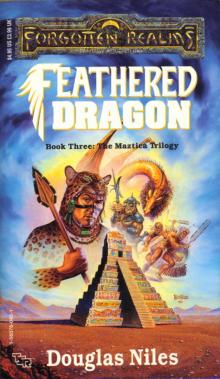 Feathered Dragon mt-3
Feathered Dragon mt-3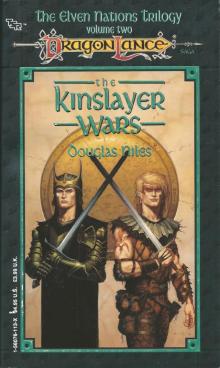 The Kinslayer Wars
The Kinslayer Wars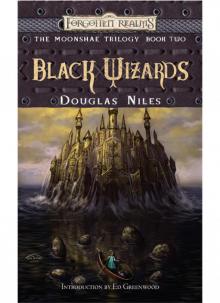 Black Wizards
Black Wizards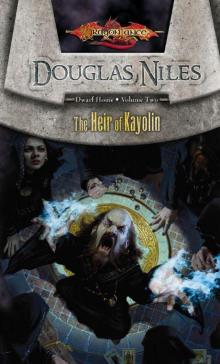 The Heir of Kayolin dh-2
The Heir of Kayolin dh-2 The Crown and the Sword tros-2
The Crown and the Sword tros-2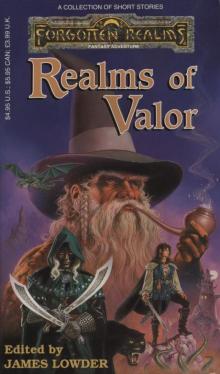 Realms of Valor a-1
Realms of Valor a-1 Wizards Conclave aom-5
Wizards Conclave aom-5 Fox On The Rhine
Fox On The Rhine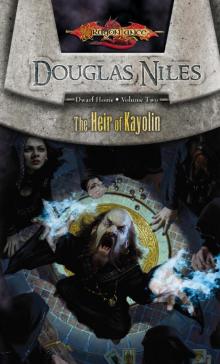 The Heir of Kayolin
The Heir of Kayolin Fox at the Front (Fox on the Rhine)
Fox at the Front (Fox on the Rhine)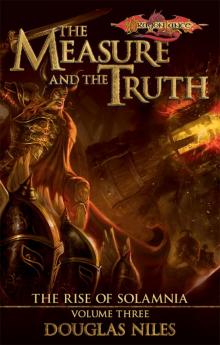 Measure and the Truth tros-3
Measure and the Truth tros-3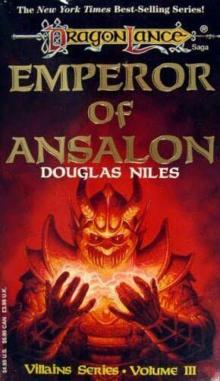 Emperor of Ansalon (d-3)
Emperor of Ansalon (d-3)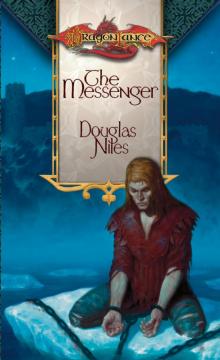 The Messenger it-1
The Messenger it-1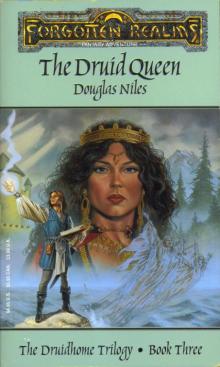 The Druid Queen tdt-3
The Druid Queen tdt-3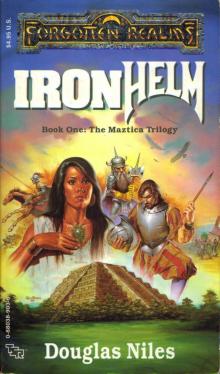 Ironhelm mt-1
Ironhelm mt-1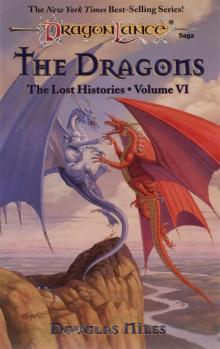 The Dragons lh-6
The Dragons lh-6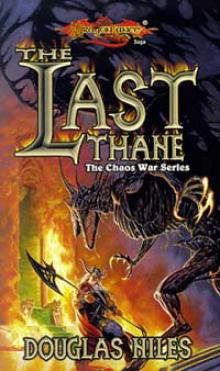 The Last Thane cw-1
The Last Thane cw-1 Circle at center sc-1
Circle at center sc-1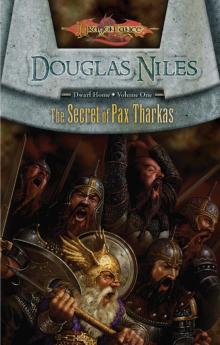 Secret of Pax Tharkas dh-1
Secret of Pax Tharkas dh-1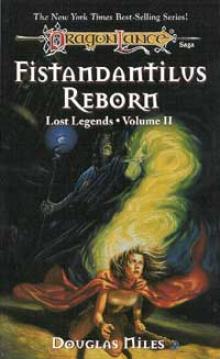 Fistanadantilus Reborn ll-2
Fistanadantilus Reborn ll-2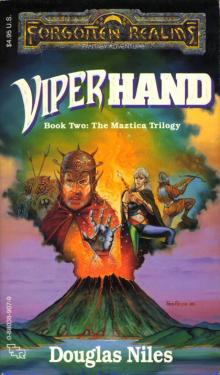 Viperhand mt-2
Viperhand mt-2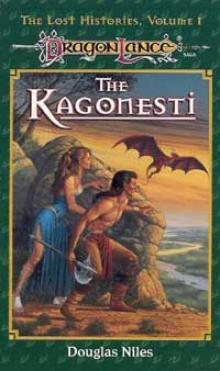 Kagonesti lh-1
Kagonesti lh-1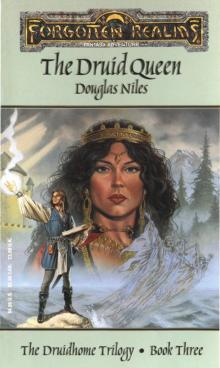 The Druid Queen
The Druid Queen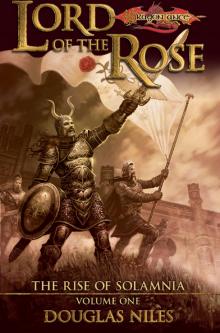 Lord of the Rose tros-1
Lord of the Rose tros-1 Goddess Worldweaver sc-3
Goddess Worldweaver sc-3 Eyeball to Eyeball (Final Failure)
Eyeball to Eyeball (Final Failure)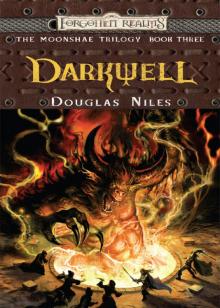 Darkwell
Darkwell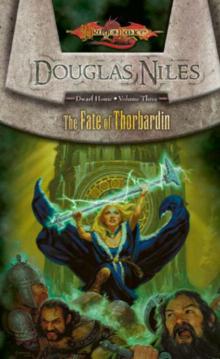 Fate of Thorbardin dh-3
Fate of Thorbardin dh-3 The Coral Kingdom tdt-2
The Coral Kingdom tdt-2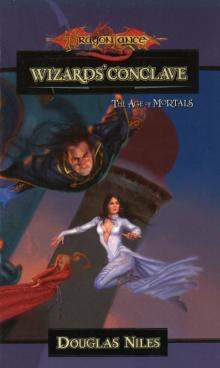 Wizard's Conclave
Wizard's Conclave The Coral Kingdom
The Coral Kingdom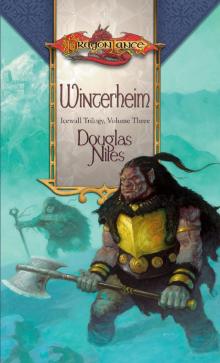 Winterheim it-3
Winterheim it-3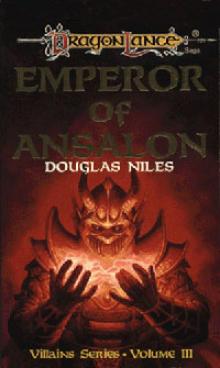 Emperor of Ansalon v-3
Emperor of Ansalon v-3 MacArthur's War: A Novel of the Invasion of Japan
MacArthur's War: A Novel of the Invasion of Japan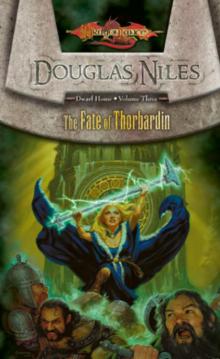 The Fate of Thorbardin
The Fate of Thorbardin The Rod of Seven Parts
The Rod of Seven Parts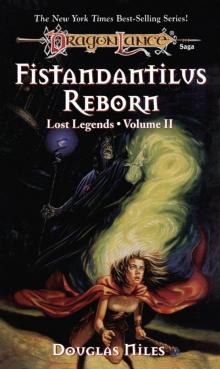 Fistandantilus Reborn
Fistandantilus Reborn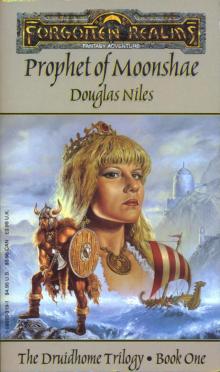 Prophet of Moonshae tdt-1
Prophet of Moonshae tdt-1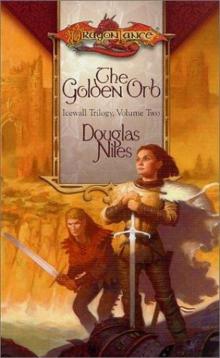 The Golden Orb i-2
The Golden Orb i-2